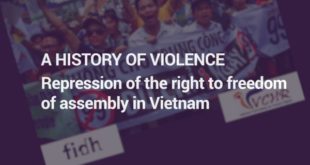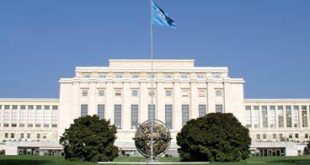The European Parliament,
– having regard to its previous resolutions on Vietnam,
– having regard to the 1995 Cooperation Agreement between the European Union and the Socialist Republic of Vietnam,
– having regard to the International Covenant on Civil and Political Rights, ratified by Vietnam in 1982,
– having regard to Rule 108(5) of its Rules of Procedure,
A. whereas the second round of talks between the European Union and Vietnam is being held in Hanoi on 20- 21 October 2008,
B. whereas a hearing on Vietnam, Laos and Cambodia was held by its Subcommittee on Human Rights on 25 August 2008,
C. whereas the next meeting of the Human Rights Dialogue between the EU Troika and Vietnam is scheduled for December 2008,
D. whereas Article 1 of the Cooperation Agreement between the European Union and the Socialist Republic of Vietnam states that ‘respect for human rights and democratic principles is the basis for the cooperation between the parties and for the provision of the agreement and that it constitutes an essential element of the agreement’,
E. whereas freedom of assembly is severely restricted: in September 2008 the Vietnamese Government launched its harshest crackdown in decades on peaceful Catholics protesters participating in prayer vigils in Hanoi to demand the return of church properties confiscated by the Vietnamese Government,
F. whereas press freedom is severely restricted: in 2008, several Vietnamese journalists have been arrested or sanctioned for reporting on official corruption, and, on 19 September 2008, the Associated Press Hanoi bureau chief Ben Stocking was arrested and beaten by police for covering a peaceful rally of Vietnamese Catholics in Hanoi,
G. whereas the ethnic minorities of the Northern and Central Highlands are still subjected to discrimination, confiscation of their land and violation of their religious and cultural freedoms; whereas neither independent NGOs nor foreign journalists have unfettered access to the Central Highlands in order to assess the real situation of the Montagnards, and in particular those forcedly repatriated from Cambodia; whereas more than 300 Montagnards have been sentenced to prison since 2001 for peaceful political or religious activities,
H. whereas, in spite of constant and repeated appeals from the international community, the leader of the Unified Buddhist Church of Vietnam, Thich Quang Do (79 years old), winner of the 2006 Rafto Prize for human rights defenders, has been imprisoned numerous times since 1982 and still remains under effective house arrest,
I. whereas the Vietnamese Government has still not recognised the Unified Church of Buddhist of Vietnam, the largest organisation of Buddhists in Vietnam,
J. whereas Vietnam has implemented legislation to limit freedom of internet access, with filtering and content controls, and has carried out arrests of numerous ‘cyber- dissidents’ for using the internet to disseminate their views on human rights and democracy or participating in online democracy discussions; whereas on 10 September 2008 internet writer and democracy activist Nguyen Hoang Hai, known by his pen name Dieu Cay, was sentenced to prison,
K. whereas members of the ethnic Khmer minority (Khmer Krom) in southern Vietnam have suffered religious persecution and land confiscation; whereas the authorities defrocked approximately 20 Khmer Krom Buddhist monks for their participation in a peaceful protest in February 2007 calling for greater religious freedom, and sentenced five to prison; whereas the Vietnamese authorities have placed Khmer Krom monk Tim Sakhorn under house arrest after his release from prison in May 2008; whereas the authorities have used excessive force against Khmer Krom farmers petitioning for resolution of land conflicts,
1. Stresses that the human rights dialogue between the European Union and Vietnam must lead to tangible improvements in Vietnam; asks the Council and the Commission to reassess cooperation policy with Vietnam, bearing in mind Article 1 of the 1995 Cooperation Agreement, which states that cooperation is based on respect for democratic principles and fundamental rights;
2. Calls on the Commission to establish clear benchmarks for the evaluation of the current development projects in Vietnam in order to ensure their compliance with the human rights and democracy clause;
3. Calls on the Commission and the Council, in the framework of the ongoing negotiations for a new Partnership and Cooperation Agreement, which will include a clear human rights and democracy clause accompanied by an implementation mechanism for this clause, to raise with the Vietnamese side the need to stop the current systematic violation of democracy and human rights before the finalisation of the agreement and, in particular, to ask the Vietnamese Government:
– as a member of the UN Security Council, to actively cooperate with UN human rights mechanisms, by inviting the Special Rapporteur on Religious Intolerance, who last visited Vietnam in 1998, and the Working Group on Arbitrary Detention, which last visited Vietnam in 1994, to visit Vietnam; and to provide UN officials and Special Rapporteurs with unrestricted access to all regions, including the Central and Northern Highlands, where they should be allowed to conduct confidential interviews with political and religious prisoners and detainees, as well as with Montagnard asylum seekers returned to Vietnam from Cambodia;
– to immediately release all people imprisoned or detained for the peaceful expression of political or religious beliefs, including more than 300 Montagnard Christians, as well as Khmer Krom Buddhist monks, democracy activists, land rights petitioners, cyber- dissidents, trade union leaders, Catholic parishioners, and followers of Hoa Hao Buddhism and the Cao Dai religion;
– to immediately provide full freedom from house arrest to Thich Quang Do, supreme patriarch of the Unified Buddhist Church of Vietnam, and Khmer Krom monk Tim Sakhorn, who was released from prison in Vietnam in May 2008 but remains under house arrest;
– to allow independent religious organisations to freely conduct religious activities without government interference and allow these religious organisations to independently register with the government if they choose to do so; to return church properties and pagodas confiscated by the Vietnamese Government and to re- establish the legal status of the Unified Buddhist Church of Vietnam;
– to repeal provisions in Vietnamese law that criminalise dissent and certain religious activities on the basis of imprecisely defined ‘national security’ crimes to ensure that these laws cannot be applied against those who have exercised their basic rights to freedom of expression, assembly, association and religious belief;
– to end the Vietnamese Government’s censorship and control over the domestic media, including the internet and electronic communications, and authorise the publication of independent, privately- run newspapers and magazines;
4. Instructs its President to forward this resolution to the Council, the Commission, the governments of the ASEAN member countries, the United Nations Secretary- General, the United Nations High Commissioner for Human Rights and the Government and Parliament of Vietnam.
 Quê Me Quê Me: Action for democracy in Vietnam & Vietnam Committee on Human Rights
Quê Me Quê Me: Action for democracy in Vietnam & Vietnam Committee on Human Rights




